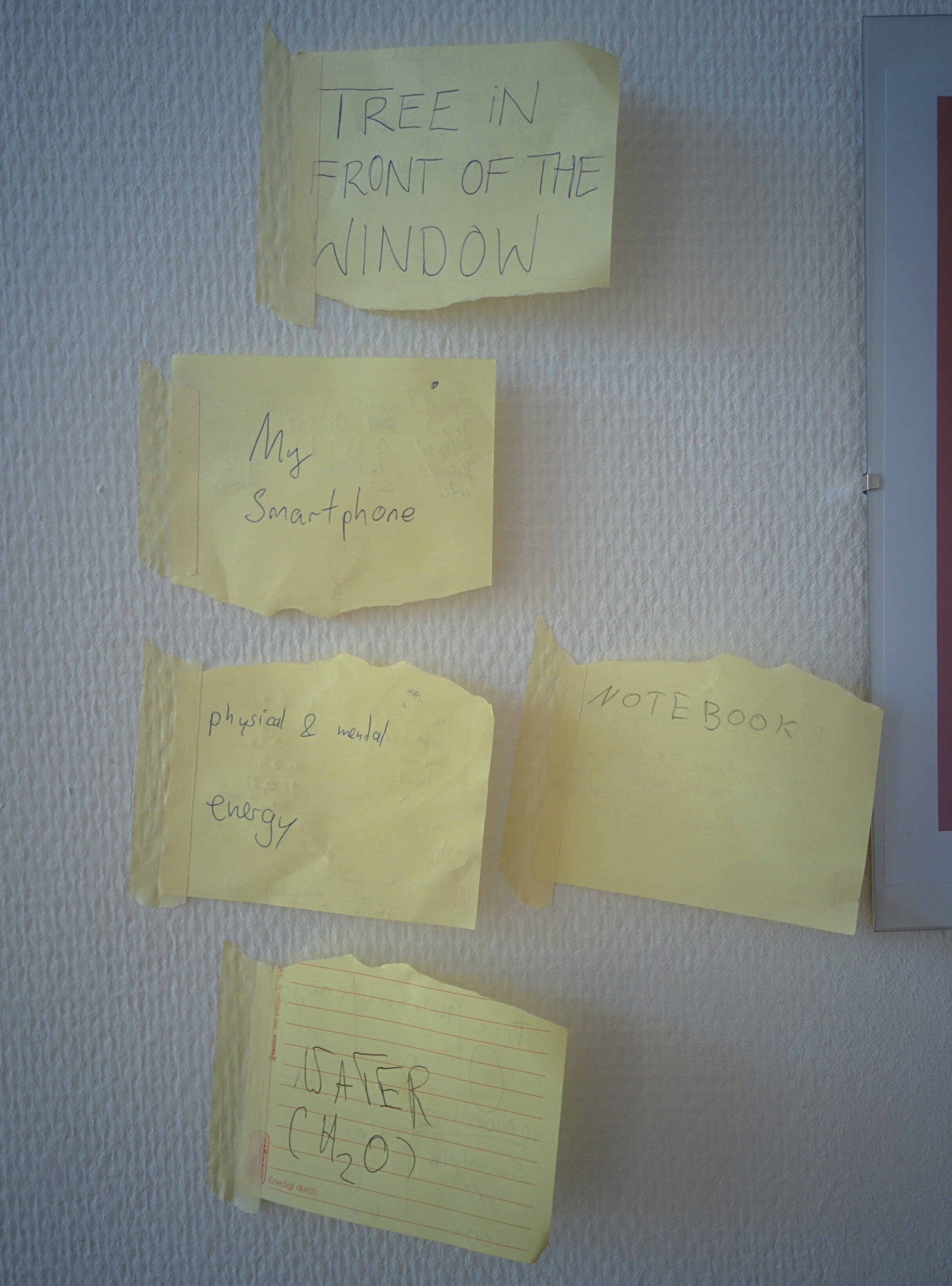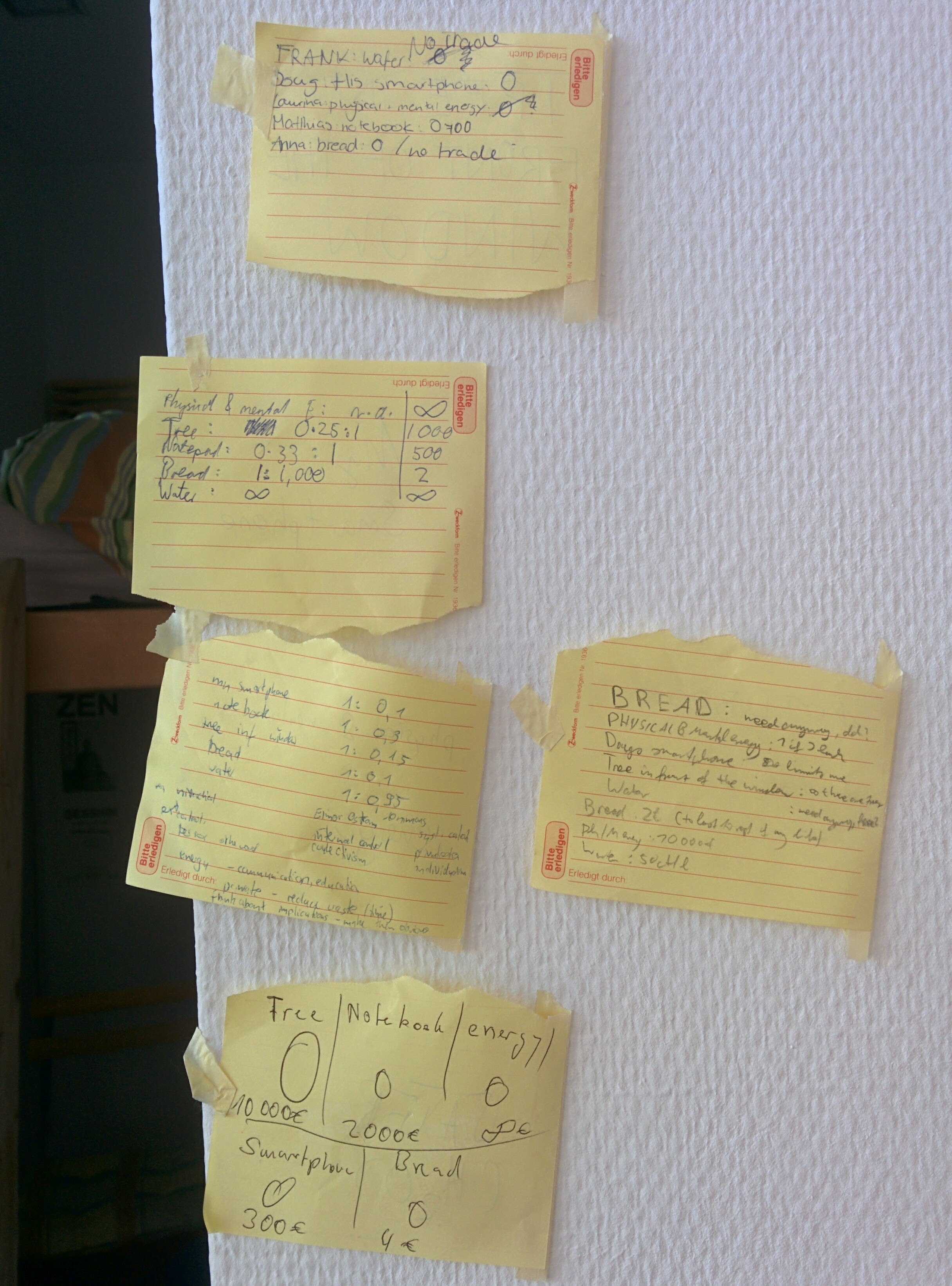2017-03-27 - Commons Workshop
- Workshop leader: Douglas Webb
- Also present: Matthias Larisch, fr4nk 0nf1r3, Rosina Klotz, Laurina and Anna.
- Location: Harzgerode
- Language: English.
Question: What is a resource?
Response: Something that is potentially or definitely valuable. Gold bar, gold mine, time, memory, avocados, T-shirts... Everything?
Question: What is a scare resource?
Response: Something which is physically or energetically limited wrt to the lifespan and capability of a person. Pyramids, lithium, etc. Scarce/non-scarce binary division is too simplistic.
Value can be thought of in terms of exchange-value and use-value. (Marx?) Thoughts on language: 'Profit & Loss' vs. 'Use & Waste'. Defining 'waste' as 'sub-optimal use' gives a falsifiable meaning which is easier to identify than 'best use.'
Activity: each person thought of a resource that is important to them and wrote it on a card. Then, without speaking, people met in pairs and thought of the use-value of the item on their card and on the other persons card. Then, if they could only have one of the other, they wrote down the ratio at which the items would be equal. For example, if someone had 'a gold bar' and the other had 'an avocado', they might write down 1:10,000. After this, people were asked to roughly estimate how much they would pay for the items if they could get them no other way.
Result: People had very different values for the same items and it was often impossible to create a ratio or price. "If you try to simplify a complex system by trivializing it, you destroy it." - Peter Kruse.
Tragedy of the commons
Imagine a field which can sustain 100 sheep for a practically infinite amount of time, 1000 sheep for 10 years or 10,000 sheep for 6 months. Ten shepherds go to the field and decide to farm ten sheep each. One day one shepherd decides to keep one more sheep and each of the other shepherds do the same, leading to 110 sheep altogether. The shepherds begin to realize the field won't last forever at this rate and it may lead them to keep even more sheep whilst the field lasts. This escalation of unsustainable use quickly wastes the common resource, the field. A situation like this, where one individual thinking about their short-term interests leads to the long-term waste for many individuals is called 'tragedy of the commons' (TOTC). The TOTC has been observed with more regenerative resources like fishing stocks and forests as well as less regenerative resources like mineral deposits: A more relatable example may be a shared kitchen where one flatmate leaving dirty plates leads to everyone leaving their plates dirty.
Solutions to the TOTC.
Ruling the commons
Thomas Hobbes wrote 'Leviathan' during the English Civil War. He believed that without a monarchial hierarchy, like a king or president, that people are destined to the TOTC.
"For the laws of nature (as justice, equity, modesty, mercy, and, in sum, doing to others as we woud be done to) of themselves, without the terror of some power, to cause them to be observed, are contrary to our natural passions, that carry us to partiality, pride, revenge and the like."
In the field example, this would be like having a 'master shepherd' who would make sure there were less than 100 sheep - although they would probably keep more than 10 themself. However with larger and more complex systems a ruler could never hope to understand or control the various needs of the people. For this reasons and others, ruling the commons appears to be wasteful and unstable. (See Communism, Monarchies, Dictatorships, etc.)
Privatizing the commons
Adam Smith wrote 'Wealth of Nations' during the Industrial Revolution. He believed that the best way to avoid the TOTC is for everyone to have some control over the commons and then simply look out for themselves.
"It is not from the benevolence of the butcher, the brewer, or the baker, that we expect our dinner, but from their regard to their own interest."
In the field example, the field would be fenced off into 10 plots and if one of the shepherds overused his plot then... too bad. This approach might seem OK in the field example, but combined with certain financial and ideological factors is often wasteful and unstable. (See Capitalism, Consumerism, etc.)
(Self-)Governing the commons
Things are not completely doom-and-gloom. Robert Axelrod documented several instances where individuals cooperate for their combined and long-term interests without third-party authority and developed Game Theory from his observations. Elinor Ostrom wrote 'Governing the Commons' and won the Nobel Prize for Economics in 2009. In it she documents many situations where people have been able to sustainably use common resources without being rulers or privatization. She identified 8 factors which are present in these scenarios:
- "Define clear group boundaries.
- Match rules governing use of common goods to local needs and conditions.
- Ensure that those affected by the rules can participate in modifying the rules.
- Make sure the rule-making rights of community members are respected by outside authorities.
- Develop a system, carried out by community members, for monitoring members’ behavior.
- Use graduated sanctions for rule violators.
- Provide accessible, low-cost means for dispute resolution.
- Build responsibility for governing the common resource in nested tiers from the lowest level up to the entire interconnected system."
In the field example, this could approach could take many forms. Perhaps the shepherds meet once a month and discuss things around the fire... See Anarcho-Syndicalism, Libertarianism, etc.
Final thought: the mass of the earth and the energy flux from the Sun is essentially constant for the purposes of an individual human. As such the only things that changes is how things are arranged. If you believe that no individual has more right to the earth, the resource from which they are made, then the world is commons. As such, no one has more 'rights' from divine, or state origins, nor from personal effort. Perhaps the ultimate resource for humans which requires management is human time and energy.
Discussion:
- Quickly turned to Wurzen.
- General agreement that the building itself is a common resource. Debate about items.
- General agreement that a ruler undesirable.
- One idea that some items are private and most are common.
- Another idea that some all items are a common resource but have much higher use-value for certain individuals than others.
- Concept of resource management has significant implications for resolving conflicts.
- Matthias and Frank keen to utilize technology to capture as much data and info a possible.
- Rosina considered any idea of property, whether individual or common, to be nonsensical and that the most important thing is to make sure individuals have the skills to deal with conflicts when the arrive.
- Doug keen on 'designing use into space'. I.e. small cupboards with name tags for high-use items so that others can see who the items valuable to and can talk with them about using them. Also 'clean-table policy' with cupboards for storage, etc.
To the extent possible under law, the yunity wiki contributors have waived all copyright and related or neighboring rights to the content of the yunity wiki. More information...
You have an account but can't edit or create pages? Write us in the open chatroom or in our yunity Slack!


